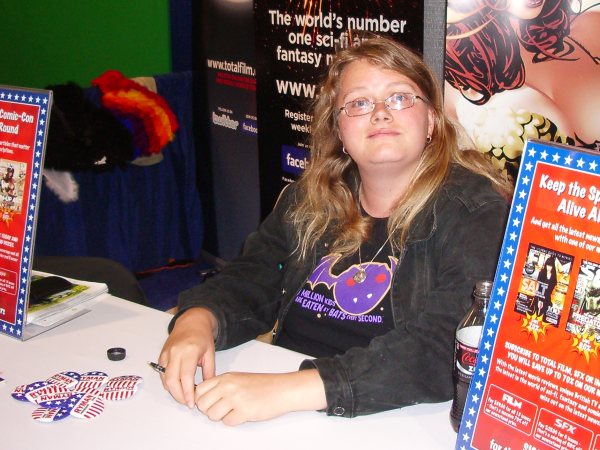Zombie interview with author Mira Grant
None
American author Mira Grant, also known as Seanan McGuire, talks to SFX about her new book Feed
Zombies are hot at the moment. Well, not literally, they're probably quite cold and clammy. But they're a hot topic in SF, fantasy and horror. Joining the shambling crowd is US author Mira Grant 's latest series of books, a trilogy about a world suffering from a zombie apocalypse. We caught up with her at this year's San Diego Comic-Con and quizzed her about disease, death, decay and all sorts of other cheerful things:
SFX: Tell us about Feed. That title has a double meaning in today's online world, right?
Mira Grant: Feed is about zombies and politics and blogging. It's about how George Romero actually saved the world! It's Night Of The Living Dead meets The West Wing.
It's set 20 years after the zombie apocalypse - Feed begins when some internet journalists manage to get hooked up with the Ryman For President campaign, and start travelling with Ryman as journalistic observers. They're reporting on everything.
And then things of course go horribly, terribly wrong.
SFX: What inspired you to write about the zombie apocalypse?
Grant: Initially what I came up with was an ecology book. I am a zombie fan but all of the zombie stories I've enjoyed started when the dead rose and ended three days later with everybody looking exhausted. I was thinking, "What happens in 20 years?" So I set up a functional ecology where we are still faced with the zombie threat but are beating it back and living with it.
And the news angle came in from there - TV remains the opium of the masses, news is the most effective control mechanism there is. But news is also something that can very quickly get out of control and start a panic. My book became about media, and what keeps us civilised, and what matters in terms of both things. If there's a political message to the book it's simply this: check several sources and figure out for yourself what's really going on!
Weekly digests, tales from the communities you love, and more
SFX: And you've always been a fan of the zombie genre then?
Grant: I was attracted to the zombie genre when my parents let me stay up to watch Night Of The Living Dead on cable TV. I was five! It all snowballed from there. I've been a big Doctor Who fan from the time I was three until the present day, too; quite a lot of the early Who episodes felt like they had zombie-type creatures in them of one type or another. Mind controlled people, shambling things. It all fed back into my love of that genre. As I got older I became fascinated with disease. I do a lot of virology and epidemiology study. And that plays very heavily into zombies because zombies are about our fear of infection.
SFX: Are zombie stories really just about catching something nasty?
Grant: There's also a fear of identity loss. If the disease zombifies your mom then she's not your mom any more. That's really a fear in zombie stories. It's a very modern fear in a lot of ways, because we've gone so long now since we've had a real, virulent, airborne, easy-to-catch pandemic. So that people now are very afraid of quarantine; quarantine is terrifying to most folks. We're also afraid of something that you can't stop. And quarantine would be the only way to handle an outbreak like this, but people are immediately afraid of that solution.
SFX: You're not a doctor by profession so where does the interest in epidemiology come into your life?
Grant: My interest in disease is a hobby! I read courses at UC Berkley, I attend lectures. It's just fascinating to me - the things that viruses can do, the adaptations they make. And our very modern attitude towards them now: we are cocky in a lot of ways about our approach to disease. But we need to understand that when the world ends it probably won't be nukes; it will be a vial dropped somewhere. We are currently missing sufficient weaponised smallpox to kill every person on this world 50 times over, did you know that? We lost 3.5 tons of weaponised smallpox at the end of the Cold War.
There is a list of things I'm not allowed to discuss at the dinner table! I am extraordinarily passionate about the Black Death, which is not something most people are in to. The epidemiological archaeology does not support the bubonic plague as the primary pathogen - there's a lot of scholarship indicating that it was a completely separate virus, most of which is taken from the church records of the time. And also the dovecotes in England - you can trace the spread of the black rat by when villages raised their dovecotes higher off the ground (to escape the ground rats). But it seems that they started raising the dovecotes 10 or 15 years after the Black Death had been reported coming through areas. So either they were all dying and nobody gave a crap about the doves until later... or the black rat is not connected with the spread of the disease.
SFX: A plague can really alter how a society thinks...
Grant: A good die-off changes everything. It doesn't matter where we are as a society, what our achievements are as people. A good die-off will always change society.
SFX: Are you telling this story over a series of books?
Grant: Feed is the first of a trilogy - there are Feed, Deadline, Blackout. They're coming out in one year increments with a May release date in the US and then June in the UK. Feed is already out in the UK. The three books tell a complete story. When you reach the end of Blackout, I'm done with that. I may eventually go back to write more books in this universe but I'm going to leave those nice people alone!
SFX: What are your literary influences?
Grant: I've been reading Stephen King since I was about seven. And Shakespeare, oddly enough! I have an aunt who believed strongly that teaching kids that Shakespeare is "hard" is wrong, so she handed me Hamlet when I was in kindergarten to see what would happen. What happened was I did a book report on Hamlet and caused quite a lot of trouble!
So Shakespeare I love - he does things that are really odd. If you outline one of his plays as a treatment, it shouldn't work. You'll have this very serious drama and then there's this hugely comic scene just thrown in the middle, breaking up the tension. These days somebody would say, "You can't do that. It breaks up your narrative arc." But it actually strengthens your narrative arc because it gives you more to cling to, more to hang on to. I get a lot out of Marvel comics too, I've been influenced a lot by those. They have stories that go on for 20 or 30 years! My obsession with continuity comes from Marvel comics and Doctor Who. If I put something somewhere, I can come back to it 100 stories from now and someone out there will know that it's the same thing.
A lot of urban fantasists influence me in one way or another too - Kelley Armstrong, that lot. They're doing amazing things with the genre.
SFX: What fictional horrors are you dreaming up next?
Grant: After Blackout I'm considering doing a trilogy about parasitic infestations. Parasites are a big thing right now... around my house anyway. Never go out for sushi with me, it's not a good plan!
I would like to do something about tape worms. If you think about a tape worm, it's almost the American dream in parasite form. You'll lose weight no matter what you eat! There's evidence to suggest that parasiticism is a counter indicator of allergies and certain eating disorders. So if you've got hay fever and colitis - get a tape worm! Your allergy and your colitis will go away... and you'll probably get thin. It's the American dream. So I'm working on an idea about a medically engineered tapeworm that people sell as an amazing health and diet aid.
Which of course goes horribly, terribly wrong.
SFX: Thank you!

This is a picture of Mira Grant signing on the SFX stand at Comic-Con this July. Visit the official site of Mira Grant's books here . What's your zombie survival plan? What do you think zombies represent ? Get your thought shotgun out and blast us with opinions in the comment thread below...

Dave was once the Group Editor-in-Chief for Future's film group, but now he's the COO of Pocket Gamer and Pocket Gamer Biz. He also freelances for SFX Magazine and hosts the Robby The Robot's Waiting podcast with a couple of friends.


